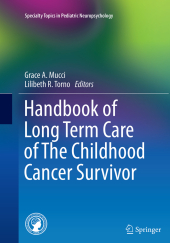 Neuerscheinungen 2016Stand: 2020-02-01 |
Schnellsuche
ISBN/Stichwort/Autor
|
Herderstraße 10
10625 Berlin
Tel.: 030 315 714 16
Fax 030 315 714 14
info@buchspektrum.de |

Grace A. Mucci, Lilibeth R. Torno
(Beteiligte)
Handbook of Long Term Care of The Childhood Cancer Survivor
Herausgegeben von Mucci, Grace A.; Torno, Lilibeth R.
Softcover reprint of the original 1st ed. 2015. 2016. xxiii, 542 S. 27 SW-Abb., 8 Farbabb. 254 mm
Verlag/Jahr: SPRINGER, BERLIN; SPRINGER US; SPRINGER 2016
ISBN: 1-489-97871-2 (1489978712)
Neue ISBN: 978-1-489-97871-4 (9781489978714)
Preis und Lieferzeit: Bitte klicken
This authoritative reference examines in depth the myriad challenges facing pediatric cancer survivors and proposes a robust framework for structured follow-up of these patients through adulthood. Approaches to long-term follow-up include both established models of care and targeted models of lifelong surveillance of late effects by bodily systems and neurological outcomes. Sections devoted to quality of life and re-entry after treatment focus on key concerns such as health risk behaviors, school and career issues, psychological challenges, and care disparities. And a robust resources section adds extra usefulness to the expert coverage.
Among the Handbook´ s topics:
- Developmental considerations in the transition from child and adolescent to adult survivorship.
- Long-term follow-up roadmaps by disease and treatment.
- Neuropsychological effects of pediatric brain tumors and associated treatment.
- Building resiliency in childhood cancer survivors: a clinician´s perspective.
- School issues and educational strategies for survivors of childhood cancer.
- Educating and preparing the childhood cancer survivor for long-term care: a curriculum model for cancer centers.
A work of rare scope, scholarship, and clinical acumen, the Handbook of Long-Term Care of the Childhood Cancer Survivor is a rewarding, practice-building resource essential to a wide range of healing professionals, including primary care physicians, pediatricians, oncologists, nurses, psychologists, neuropsychologists, child psychologists, and licensed therapists.
SECTION I: SURVEILLANCE OF THE SURVIVOR .- The long and winding road: Transitions in care for the childhood cancer survivor.- Developmental Considerations in the Transition from Child and Adolescent to Adult Survivorship.- The European Experience of Establishing Guidelines for Surveillance of the Childhood Cancer Survivor SECTION II: SURVEILLANCE OF MEDICAL LATE EFFECTS.- Long Term Follow Up Roadmaps by Disease and Treatment.- Central Nervous System.- Endocrine System.- Cardiovascular System.-Pulmonary System.- Renal, Genitourinary and Reproductive System.- Gastrointestinal and Hepatic Systems.- Musculoskeletal System.- Eye, Ear and Oral Health.- Hematopoietic Stem Cell Transplant.- Second Malignant Neoplasms.- SECTION III: NEUROPSYCHOLOGICAL LATE EFFECTS.- Neuropsychological Outcomes of Childhood Leukemia Survivors.- Neuropsychological Effects of Pediatric Brain Tumors and Associated Treatment.- SECTION IV: PSYCHOSOCIAL FACTORS AND QUALITY OF LIFE.- Psychological Challenges and Adaptation in Long-Term Survivors of Childhood Cancer.- Building Resiliency in Childhood Cancer Survivors: A Clinician´s Perspective.- Cultural and Linguistic issues in the Assessment and Treatment of Pediatric Cancer Survivors.- Quality of Life During Palliative Care.- SECTION V: RE-ENTRY AFTER TREATMENT.- Lifestyle Factors and Health Risk Behaviors.- School Issues and Educational Strategies for Survivors of Childhood Cancer.- Special Education Laws.- Career and Vocational Outlook.- Rehabilitation Considerations in Pediatric Cancer Survivors.- Neurocognitive Late Effects in Children Treated for Cancer: Psychological Impact, Identification, and Prevention and Remediation.- Psychopharmacological Interventions in Childhood Cancer Survivors.- The Cancer Survivor and Complementary Health Approaches.- Barriers and Disparities in Accessing Quality Care Amongst Childhood Cancer Survivors.- Educating and Preparing the Childhood Cancer Survivor for Long-Term Care: A Curriculum Model for Cancer Centers.- SECTION VI: RESOURCES.


